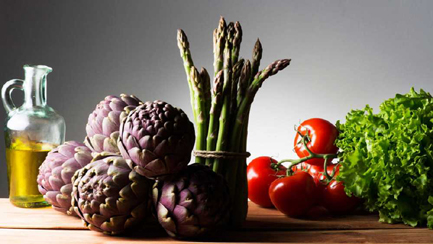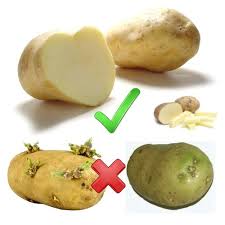Some days ago, I could listened on the radio a very curious news and I have just found the same news, that says the following: “They show that fried vegetables with olive oil are healthier than cooked”.

Researchers, at the University of Granada (UGR), have shown that fried vegetables, with olive oil, improve antioxidant capacity and the content of phenolic compounds, which prevent chronic degenerative diseases such as cancer, diabetes or macular degeneration.
In an article, published in the journal Food Chemistry, the scientists have found that frying, in extra virgin olive oil (EVOO), is the cooking technique that more increases the phenolic fraction of fresh vegetables, included in the Mediterranean diet.
That is, foods such as potatoes, squash, tomatoes and eggplant improve, in the cooking process.

.jpg)
 - Copy 4.jpg)
.jpg)
To conduct the study, the researchers designed an experiment, in which they cooked portions of 120 grams of potato cubes (Solanumtuberosum), pumpkin (Cucurbitamoschata), tomato (Licopersicumesculentum) and eggplant (Solanummelongena), without seeds and skin.
Thus, they fried and skipped the vegetables with oil and also they boiled them, in water or a mixture of water and AOVE. They controlled experiments to ensure all processing conditions, and the ratio, between the plant and the means of cooking, was remained constant, according to traditional Spanish recipes.
Processed vegetables were maintained under conditions suitable for the determination of moisture, fat, dry matter and total phenols, and the measure of antioxidant capacity by different methods.
Alongside, the study was completed with the determination, by High Performance Liquid Chromatography (HPLC, for its acronym in English) of the content of individual phenolic compounds, characteristic of vegetables.
The results showed that the use of AOVE, during frying of vegetables, increases their fat content and reduces its moisture, while in the rest of techniques, this effect is not observed.
"By comparing the total phenolic content, compared to fresh vegetables, we found both increases and decreases, according to the applied technique", explained one of the authors of this work, the teacher at UGR, Cristina Sanchez Samaniego.
"Oil, as heat means transfer, increases the content of phenolic compounds in vegetables, compared with other cooking techniques, such as boiling, where heat transfer occurs across the water", she says.
This is due to that a transfer occurs, from phenols AOVE to vegetables, these enriched, with phenolic compounds, exclusive of oil, which are not naturally present in fresh vegetables.
"Therefore, we can say that frying is the technique, that produces higher associated increases, in phenolic fraction, representing an improvement, in the cooking process, although it increases the caloric density of food, because of the amount of oil absorbed" , emphasizes Samaniego.
All cooking techniques increased the antioxidant capacity of the four vegetables; there were only reduced or no significant changes, after cooking, in water, in specific cases.
The researcher, at the UGR, points out that, each vegetable cooked, developed a profile of phenols, moisture content, fat, dry matter and antioxidant activity, determined by the original characteristics of fresh vegetables and cooking technique applied.
"When the phenol content of raw vegetable is high, the total phenolic content is further increased, if AOVE is included, during processing and the application of treatments boiled does not affect the final concentrations", said Samaniego.
"The cooking method, including water, may be recommended, when food is consumed along with the means of boiling, and adding AOVE improves phenolic profile and compensates for deficiencies, in raw foods", says the researcher.
The results of this article are part of the doctoral thesis of Jessica del Pilar Ramirez Anaya, made under the direction of the teachers, at the UGR, Cristina Sanchez Samaniego, Marina Villalón Mir and Herminia López-García de la Serrana, in the Department of Nutrition and Food Science, at the Faculty of Pharmacy, at the University of Granada, and with the support of PROMEP / SEP, Mexico UDG-598, program.
Well, once again, some Spanish researchers are at the head of the international medical research. I hope that you have found this news very interesting.
Until my next post, kind regards,
Luis.
Sponsored by Costaluz Lawyers.
Please click below:
